 Petzlover
Petzlover Bergamasco is originated from Italy but Lucas Terrier is originated from United Kingdom. Bergamasco may grow 32 cm / 13 inches higher than Lucas Terrier. Bergamasco may weigh 29 kg / 64 pounds more than Lucas Terrier. Both Bergamasco and Lucas Terrier has almost same life span. Bergamasco may have more litter size than Lucas Terrier. Both Bergamasco and Lucas Terrier requires Moderate Maintenance.
Bergamasco is originated from Italy but Lucas Terrier is originated from United Kingdom. Bergamasco may grow 32 cm / 13 inches higher than Lucas Terrier. Bergamasco may weigh 29 kg / 64 pounds more than Lucas Terrier. Both Bergamasco and Lucas Terrier has almost same life span. Bergamasco may have more litter size than Lucas Terrier. Both Bergamasco and Lucas Terrier requires Moderate Maintenance.
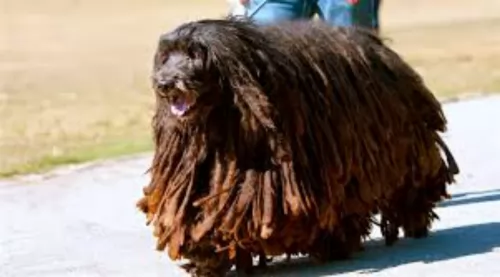 The Bergamasco comes from northern Italy. This medium sized sheepdog is of ancient origin. Known as an Italian sheep herding breed, his name actually comes from the town where he comes from - Bergamo.
The Bergamasco comes from northern Italy. This medium sized sheepdog is of ancient origin. Known as an Italian sheep herding breed, his name actually comes from the town where he comes from - Bergamo.
It was after World War II that there was danger that this breed would disappear as the need for herding and shepherding was diminishing. An Italian breeder, however, Dr. Maria Andreoli, stepped in to save the breed.
It was in 2015 that the American Kennel Club also changed the breed’s status from Miscellaneous to the Herding Group.
 The Lucas Terrier is a rare breed which hails from England, originating there in the late 1940s. Today it is considered a purebred. It was originally a hybrid dog, bred by crossing a Norfolk Terrier with a Sealyham Terrier.
The Lucas Terrier is a rare breed which hails from England, originating there in the late 1940s. Today it is considered a purebred. It was originally a hybrid dog, bred by crossing a Norfolk Terrier with a Sealyham Terrier.
Sir Lucas felt that the Sealyham Terrier was a bit too big for his purpose so he crossed the Sealyham with Norfolk Terriers to bring about the Lucas Terrier. The Lucas Terrier is a dog which is essentially bred for temperament and companionship and is therefore not aggressive.
The Lucas Terrier has been in the United States of America since the late 1960s and is considered a rare breed.The Lucas Terrier Club is a private, informally run organisation developed to both preserve and promote this dog breed.
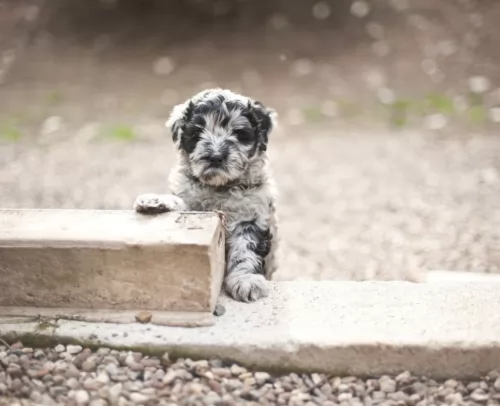 This medium sized sheepdog stands 54 – 62cm in height and weighs up to 38 kg as an adult. It is his coat which draws the most attention. It is of a coarse texture and actually greasy to the touch. It actually forms into strands or almost like dreadlocks from the top of the body, so that people agree he is one of shaggiest dog breeds there are.
This medium sized sheepdog stands 54 – 62cm in height and weighs up to 38 kg as an adult. It is his coat which draws the most attention. It is of a coarse texture and actually greasy to the touch. It actually forms into strands or almost like dreadlocks from the top of the body, so that people agree he is one of shaggiest dog breeds there are.
From age 1 on the coat starts to become woolly, and then the flocks start to form. As these clumps of hair appear, it will become necessary to separate them into smaller cords by hand to ensure attractive formation Brushing isn’t necessary but a big toothed comb can keep their hair ‘groomed’.
The colour of the coat is solid grey with patches of shades of grey and sometimes black. His dense, heavy coat makes it that he is suited to cooler climates. Because he is a herding dog, he wouldn’t do well in an apartment but would suit a home with a large garden.
He is intelligent and social but will need firm handling as he is a boisterous dog. He has a muscular yet compact body with a large head, long tail, high-set semi-drooping ears and large, gentle looking brown eyes. Although not instinctively aggressive, he makes an excellent watch dog with strong protective instincts to protect his human family.
He views new people into his circle with suspicion and wariness. He is good with kids and pets in the home and is playful and energetic.
 The sweet Lucas Terrier is a small dog breed that stands at between 25 – 30cm in height and weighs anything between 5 – 9 kg.
The sweet Lucas Terrier is a small dog breed that stands at between 25 – 30cm in height and weighs anything between 5 – 9 kg.
The chest of the dog is deep and low, the nose black, the eyes dark and almond shaped, the ears medium sized and floppy. The tail is traditionally docked, giving the dog an attractive, solid, compact look to it.
If you want your Lucas Terrier to become a parent, you can expect between 3 to 5 of the cutest little puppies. Spaying and neutering are an excellent idea health-wise if you don’t want your terrier dog to have puppies.
The weather-resistant coat of the Lucas Terrier is fairly harsh and is of medium length. While most Lucas Terriers are fawnish, cream, grey or black and tan, you also get a white one.
He does great with training and socialization and is an adaptable dog too, being happy to settle into life in the city or the countryside.
This is such a sweet, amicable, jaunty little dog, good with kids and always ready for a game. With socialization and training he is ready to get on well with everyone, as well as with other dogs in the house. It is no wonder that he is becoming so popular – he just gets on with everyone, and is eager to please.
The Lucas Terrier is generally well behaved as well and being quiet, gentle and calm indoors. Because he is a Terrier, he likes to bark quite a bit, but training and socialization can help with that. Training won’t be difficult as he is intelligent.
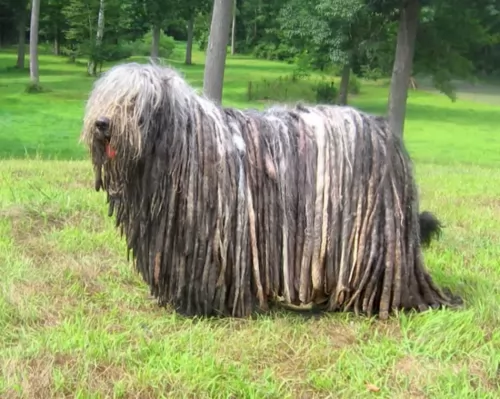 This is a working dog so they are naturally alert. He is also intelligent and independent and this independence is seen with training as he doesn’t take easily to following instructions, becoming stubborn. You’ll certainly want to have your Bergamasco socialized and trained as he can be a boisterous dog, bounding with energy.
This is a working dog so they are naturally alert. He is also intelligent and independent and this independence is seen with training as he doesn’t take easily to following instructions, becoming stubborn. You’ll certainly want to have your Bergamasco socialized and trained as he can be a boisterous dog, bounding with energy.
This is a dog that will need to be kept busy and provided with plenty of activities so that he remains happy, playful and relaxed.
Lively and intelligent, these dogs also form strong bonds with their owners and get on well with the children in the home. He will take well to country life as opposed to living in the city.
 Lively, playful, social and animated – the Lucas Terrier is such a pleasure to have around and will bring joy into your home. He is full of enthusiasm and will always be ready for a game or for a walk.
Lively, playful, social and animated – the Lucas Terrier is such a pleasure to have around and will bring joy into your home. He is full of enthusiasm and will always be ready for a game or for a walk.
They are dogs who just love being around their human family, forming close bonds with them. They’re adaptable too and slot into different situations with ease.
Gentle, calm and obedient, once you let one of these sweet dogs into your home and heart, you’ll never want to be without such a loving friend again.
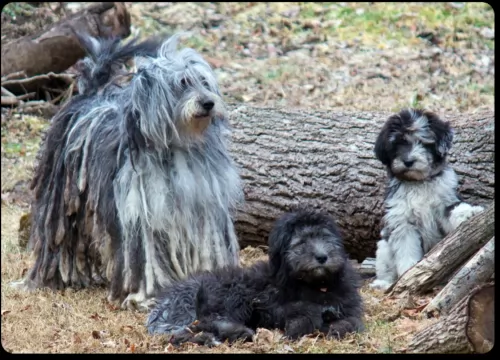 Your Bergamasco can live to be 13 to 15 years of age and he is considered to be a healthy breed. Nonetheless you want to be aware of health issues that are common to this breed
Your Bergamasco can live to be 13 to 15 years of age and he is considered to be a healthy breed. Nonetheless you want to be aware of health issues that are common to this breed
he is vulnerable to heat. He can die of heat exhaustion quicker than other breeds
keep an eye on him for hip dysplasia, progressive retinal atrophy and skin allergies
 Your Lucas Terrier is such a robust, jaunty, feisty little dog and with excellent care from you he may be able to push two decades. With a healthy diet and exercise, you shouldn’t have to be at the vet often with this dog.
Your Lucas Terrier is such a robust, jaunty, feisty little dog and with excellent care from you he may be able to push two decades. With a healthy diet and exercise, you shouldn’t have to be at the vet often with this dog.
There are however, always common dog illnesses that even the most healthy dog can succumb to – ear infections, eye infections, bloat, cancer, hip dysplasia and others.
Skin problems may seem mild, but they can bring a whole lot of frustration and pain to your pet. You’ve got to be careful because sometimes skin problems may be indicative of other health issues. Probably the most common cause of skin problems in dogs are allergies from parasites like fleas.
Bacterial skin infections are caused when your pet is bitten by a flea for instance and then he scratches and licks, breaking the skin and bacteria gets in, infecting the wound.
Yeast infections for instance could be found in the ear canal and around the anus. Infections like this occur in damp areas and also when other conditions are right. Yeast infections cause itchy skin with hair loss.
Skin infections are not to be taken lightly. They can bring a whole lot of discomfort to your pet and you will most certainly need to get him to the vet.
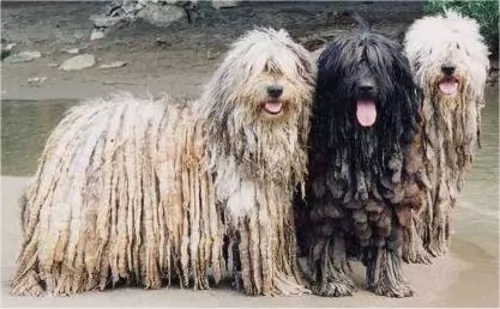 The Bergamasco isn’t a shedder but his coat will need to be combed once a week just to keep it in order. You don’t want to bath him too often, especially during the Winter as his coat takes a long time to dry. It isn’t recommended to shave a Bergamasco as the coat regulates the dogs temperature – keeping him warm and cold as the weather demands.
The Bergamasco isn’t a shedder but his coat will need to be combed once a week just to keep it in order. You don’t want to bath him too often, especially during the Winter as his coat takes a long time to dry. It isn’t recommended to shave a Bergamasco as the coat regulates the dogs temperature – keeping him warm and cold as the weather demands.
They thrive on a blend of kibble (dry) mixed with raw and-or moist food once or twice a day. Remember to include quality chicken, turkey, etc. mixed with some vegetables and rice into your dog’s diet. Ensure a constant supply of fresh water in an easily-cleanable bowl.
Balls and ropes are important for building muscle strength and burning energy. Remember your Bergamasco is a working breed and will need plenty of games and exercise.
 This little dog isn’t a high energy dog but he will need to have a daily walk over and above the games you provide him with. Giving him a walk will be stimulating for him too as it gives him the chance to see different things and sniff around a bit.
This little dog isn’t a high energy dog but he will need to have a daily walk over and above the games you provide him with. Giving him a walk will be stimulating for him too as it gives him the chance to see different things and sniff around a bit.
The Lucas Terrier is looked upon as a low maintenance breed and a low shedder. You will need to brush him twice a week to keep the coat lustrous and to remove loose hair. Hand stripping is a method used for grooming his double coat but some people prefer to have him professionally clipped.
Feeding a dog should be a simple affair. All dog breeds appreciate a simple but nutritious diet as this avoids digestive problems.
The Lucas Terrier relies on quality food full of vitamins and minerals to ensure his health and longevity. True, commercially manufactured foods aren’t a wonderful choice, but there are some good ones and they do offer a tremendous amount of convenience.
However, you don’t just want to put a bowl of dry kibble in front of your pet night after night, so to add some tasty variety, boil chicken and brown rice or pasta along with some cooked or raw vegetables and add this to his dry kibble from time to time. It makes like a delicious kind of stew to add to the dry kibble.
You’ll see, your Lucas Terrier will have bright eyes, a wet nose and a wagging tail. He’ll thank you for sticking to a simple style of feeding that doesn’t come with unpleasant surprises to upset his stomach. Make sure he always has a bowl of fresh cool water constantly available.